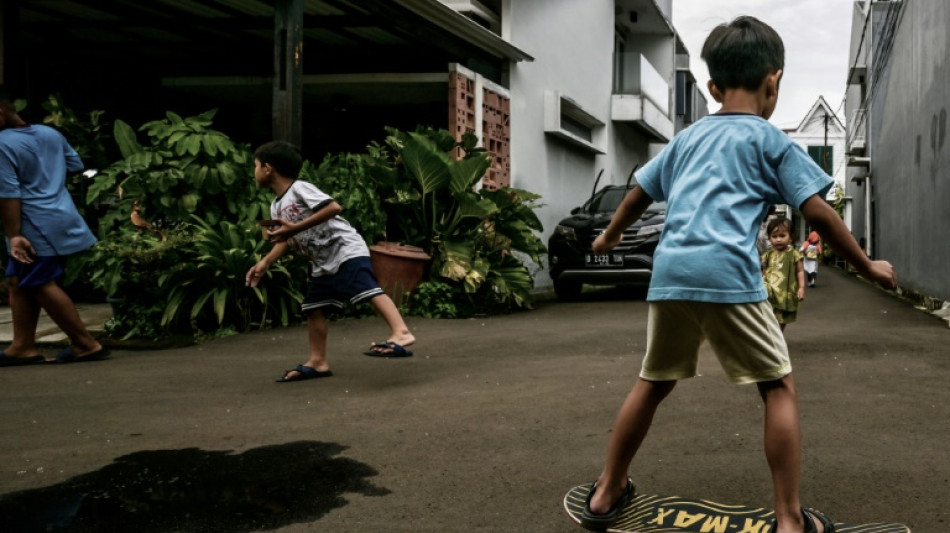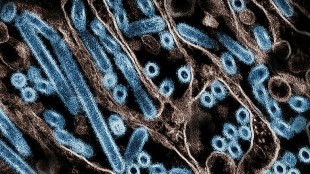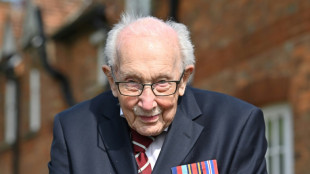

'Fix the system': Indonesia parents seek justice after cough syrup crisis
Dinosaur-themed birthday decorations still hang on the walls of Safitri Puspa Rani's Indonesian home, where the family celebrated their youngest son's birthday last year.
"Knock knock! Hey everyone! It's my eighth birthday!" said a beaming Panghegar Bhumi in a video in September, while making a heart-shaped gesture with his arms.
A month later he died from acute kidney injury, days after a doctor prescribed him a cough syrup containing ingredients that have been linked to more than 200 child deaths in Indonesia, according to the country's health ministry.
"I whispered in his ears: 'The medicine is coming, please hang in there a little bit more'," Rani said, crying in her home in West Java province as she recalled the final days of her son's life.
"But I lied, there was no medicine."
The 42-year-old mother is among more than two dozen Indonesian families seeking justice for their children, whom they allege were either killed or sickened by contaminated cough syrups.
Their class-action lawsuit targets the country's health ministry, food and drug agency, and eight companies they accuse of selling the syrups -- which the World Health Organization said contain an "unacceptable amount" of diethylene glycol and ethylene glycol.
"These contaminants are toxic chemicals used as industrial solvents and antifreeze agents that can be fatal even taken in small amounts, and should never be found in medicines," the WHO said in January.
Since October last year, the WHO has issued alerts for The Gambia, Indonesia and Uzbekistan over syrups containing the two chemicals.
Five-year-old Farrazka was required to undergo dialysis for his failing kidneys after he took one of the medicines, his mother Indah Septian told AFP.
"When I heard that he had to have dialysis, I was so confused and did not know what to do. He is just a kid," Septian said at her home.
"Now he gets easily fatigued even when he only does a bit of activity," the 31-year-old said.
But Septian and her husband Riski Agri consider themselves luckier than other families.
"Until today I still wake up in the middle of the night and check on him. We almost lost him," 34-year-old Agri said.
- 'Not a priority' -
Since the government sounded the alarm in October, Indonesia's food and drug agency has recalled 105 products after tests revealed excessive amounts of the two chemicals.
It has also revoked the licenses of six pharmaceutical firms.
Police have launched an investigation into five companies and arrested four suspects.
But the plaintiffs say that is not enough.
"From the beginning, this case was not considered a priority," said Awan Puryadi, the lawyer representing the families.
"All of the victims who are still alive, and are still being treated, must all be covered by the government for the rest of their lives."
They are seeking compensation of 2 billion rupiah ($131,000) for every person killed and 1 billion rupiah for every person injured.
In a hearing last month, parents wore black shirts that read "I thought it was medicine, it was poison".
The next hearing is scheduled for March 9.
One of the accused companies in the lawsuit contacted by AFP denied putting the chemicals in its cough syrups and blamed a distributor for any contamination.
Indonesia's drug regulator, like the WHO, says the chemicals should never be used in syrup medicines because they can be toxic for humans.
But it says in the event of contamination during production, the chemicals can be consumed safely up to a level of 0.1 milligrams per millilitre.
Four other companies named in the lawsuit did not respond to a request for comment and AFP was not able to reach three firms. The seven have not commented publicly on the lawsuit or the allegations.
- Expensive treatments -
Without compensation, the injured children's parents face treatment costs that many cannot afford.
Eighteen-month-old Raivan was unable to move after he consumed cough syrup prescribed by a paediatrician in May, said his mother Resti Safriti.
He is now fed through a tube, and breathes through another in his neck.
In the hopes of replicating physical therapy techniques, his parents resort to rocking him on an exercise ball in their Jakarta home.
"We could not afford therapy, so we do what we can with what we have at home," Resti said.
Resti and her husband had to leave their jobs to take care of him, and she begged the government to "fix the system" that has led to her child's suffering.
"Don't let other parents and children go through this," she said. "What if this happened to your own child?"
(H.Leroy--LPdF)




